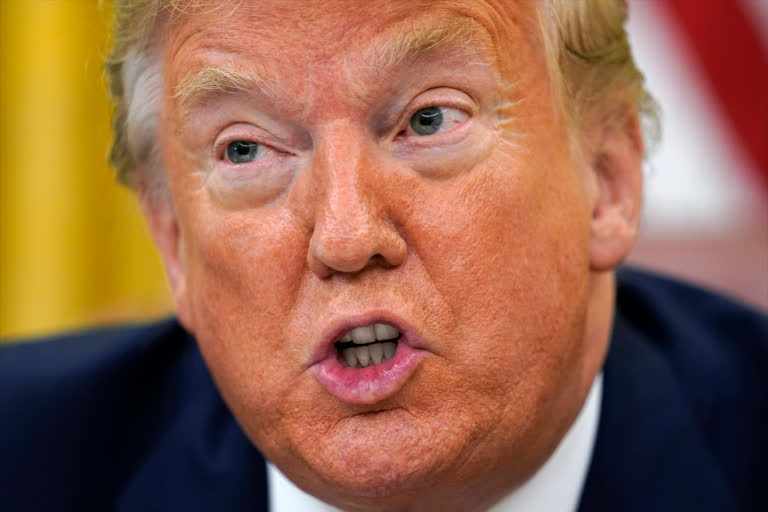Washington: President Donald Trump on Friday called protesters in Minneapolis “thugs” and said that "when the looting starts, the shooting starts” drawing another warning from Twitter for his rhetoric. Trump tweeted after protesters outraged by the death of a black man in police custody torched a police station.
Earlier Thursday, Trump said, "I feel very, very badly" about George Floyd's death while handcuffed and in the custody of Minneapolis police. "That’s a very shocking sight.”
It was the kind of personal statement expected from a president in response to the disturbing video of a black man gasping for help as a white policeman pinned him to the street by the neck. But it was a very different tone for Trump, who has often been silent in the face of white-on-black violence and has a long history of defending the police.
Trump’s language got more aggressive as violence boiled over in Minneapolis on Thursday night. “These THUGS are dishonouring the memory of George Floyd, and I won’t let that happen,” he tweeted. “Just spoke to Governor Tim Walz and told him that the military is with him all the way. Any difficulty and we will assume control but, when the looting starts, the shooting starts. Thank you!"
Twitter added a warning to Trump's tweet about the Minneapolis protests, saying it violated the platform’s rules about “glorifying violence.” Earlier this week, it applied fact checks to two of his tweets about mail-in ballots.
Read more:Protesters enter Minneapolis police station, set fires
Once more likely to hew to the “blue lives matter” mantra, Trump and his allies have been questioning an officer’s conduct and calling for justice for Floyd. But some activists doubt that Trump has suddenly evolved on the issue of police brutality and instead see election-year political calculations.
“This is the first race-tinged case that I’ve ever heard him address” as president, said the Rev. Al Sharpton, a civil rights activist and Trump critic who has known the president for decades. “So, therefore, he cannot be upset when people feel that it’s empty words because it is so out of character.”
Trump has been silent on several high-profile police-involved killings, including that of Stephon Clark, a black man shot by Sacramento, California, police in 2018.
“This is something that is a local matter and that’s something that we feel should be left up to the local authorities,” then-White House press secretary Sarah Sanders said at the time.
Trump has never addressed the 2014 death of Eric Garner, who was placed in a chokehold by police trying to arrest him for selling loose cigarettes. Video of the encounter was viewed millions of times online, and Garner’s dying words, “I can’t breathe,” became a rallying cry for the Black Lives Matter movement. Trump has, however, invoked those words on several occasions to mock political rivals, even bringing his hands to his neck for dramatic effect.
Trump has a long history of injecting himself into racially sensitive cases. In 1989, he took out full-page newspaper ads calling for the death penalty for the Central Park Five, five young men of colour who were wrongly convicted of a brutal assault on a jogger. Trump has never apologized, telling reporters last year: “You have people on both sides of that.”
Also read:Four Minneapolis officers fired after death of black man
Trump also spent years railing against NFL quarterback Colin Kaepernick for kneeling during the national anthem to protest racial injustice and police brutality. And he has even appeared to advocate for the rougher treatment of people in police custody, speaking dismissively of the police practice of shielding the heads of handcuffed suspects as they are being placed in patrol cars.
But Trump's tone has changed in recent weeks as he has repeatedly expressed dismay at footage of the killing of Ahmaud Arbery, the 25-year-old black man fatally shot in February in Georgia while jogging.
“You know, my heart goes out to the parents and the family and the friends," he told reporters this month. "It’s a heartbreaking thing.”
